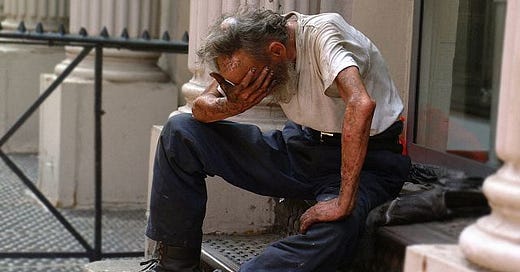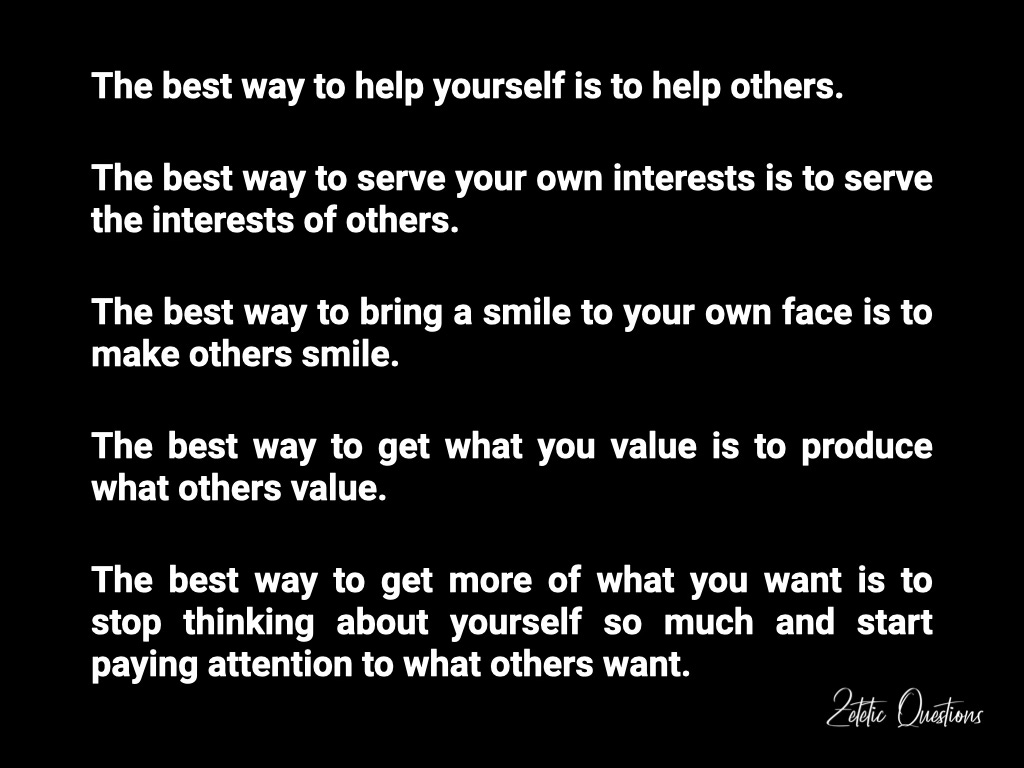Short Stack: Solving the Problem of Poverty
The best way to help yourself is to help others. The best way to get more of what you want is to produce what others want.
I’ve long found it curious that among those who loudly proclaim their concern for the poor—among those who insist they are “compassionate” and “empathetic”—very few seem interested in understanding the conditions in which human beings are most incentivized, and therefore most likely, to escape poverty by creating wealth and improving their lives.
Often, these loud people are eager to share how they feel, but show little desire to learn. I assume they equate venting emotions with being good.
Odd, eh?
Wise men and women understand that poverty is nothing new; it is as old as human nature itself. Poverty is the original condition of the human condition. The earliest human beings, living in caves—or worse—were mired in desperate poverty, often without a reliable source of heat or knowing where their next meal or drink of water would come from.
There’s no real mystery about what causes poverty. In fact, nothing causes poverty. When people do nothing, they either remain poor or regress back into poverty.
What we call “cold” is actually the absence of heat; what we call “dark” is actually the absence of light; what we call “poverty” is actually the absence of wealth and prosperity.
The important question, then, is: What causes human prosperity? For millions of Americans who assume taxing and spending programs solve all problems, the answer might be surprising: Prosperity is the result of creating wealth for oneself by producing value for others.
When you make, provide, or do something that others value, you are creating wealth yourself.
Steve Jobs became wealthy by inventing and improving the smartphones now used and valued by nearly two billion people.
Jeff Bezos created wealth by launching Amazon.com—originally just an online bookstore—and developing it into the largest e-commerce platform in the world, which millions of people value and use every month.
Professional athletes like Juan Soto, Shohei Ohtani, Aaron Judge, Patrick Mahomes, and Jayson Tatum earn enormous salaries because millions of people value watching sports played at the highest, elite level of human excellence.
To boot, when you produce value for others, that doesn’t prevent me from being productive, too!
The best way to help yourself is to help others. The best way to serve your own interests is to serve the interests of others. The best way to bring a smile to your own face is to make others smile. The best way to get what you value is to produce what others value. The best way to get more of what you want is to stop thinking about yourself so much and start paying attention to what others want.
These are the beautiful moral maxims of wealth creation.
A related and important question follows: In what conditions are people most incentivized to create wealth for themselves by producing what others want, need, and value? For the same millions of Americans who assume taxing and spending programs solve all problems, again, the answer might be surprising: Human beings are most likely to escape poverty and improve their lives by creating wealth when they live in conditions of freedom.
Where people enjoy legal protections for their own individual liberty and private property—including the poor and those born with little—they have strong incentives to be productive, inventive, innovative, and entrepreneurial. They know they will be able to keep what they produce, earn, and purchase, which makes them more willing to take risks and try to create new wealth.
Where people are truly free, one finds fewer individuals living in poverty.
Where people are truly free, one finds larger populations with access to clean water, nutritious food, well-built homes, advanced medical technologies, educational choices, and professional opportunities.
Where people are truly free, one finds more people born poor who then escape poverty by creating wealth through work that produces value for others.
Within a regime of liberty, poverty is a starting point for some, not a life-sentence.
Those who truly care about the poor—and about those who struggle to acquire life’s basic necessities—should become advocates for the conditions of freedom: individual liberty and private property, the rule of law, equal protection of the laws for equal individual rights of all citizens, and a government whose powers are constrained by a wisely-designed constitution.
As history repeatedly shows, nothing helps the poor more than turning the principles of freedom into lived political and economic reality. And while some people may continue to feel good about venting their emotions over poverty, their feelings don’t actually help those who are poor.







Dr. K.,
This has to be the most hard hitting and morally compelling case I’ve ever read addressing the issue of how to actually solve poverty. It demands that we ask the hard question: what creates prosperity in the first place? And the comparison of poverty to darkness, not as something caused, but as something that exists in the absence of light (or in this case, wealth creation), is simply brilliant.
What struck me most is the defense of freedom as the greatest ally of the poor. Too often, we hear cries for justice divorced from the very conditions that make human flourishing possible.
Your piece cuts to the core and reminds us that dignity doesn’t come from handouts. It comes from empowerment, opportunity, and the right to keep the fruit of one’s labor.
I pray that many people read this and take action such that we might finally start shifting the conversation from tolerating poverty to ending it.
Thank you!
At the root of "prosperity" is liberty. Leaving each of us alone to live our lives as we pursue whatever represents our particular "happiness."
All that remains is what is termed "rule of law," properly upheld property rights, and market-derived money and credit.
The growing wealth then unfolds naturally and universally!
Great article.